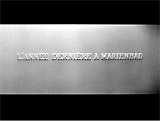
|
Last Year at Marienbad (1961,
Fr/It.) (aka L'Année Dernière à Marienbad)
In this enigmatic, cinematically puzzling, and ambiguous
New Wave film - a black and white expressionistic film and fragmented
tale about dreamy seduction from director Alain Resnais, that mixed
time (past and present), and reality (fantasy vs. memory). Many critics
have regarded the film as having a strong influence on Stanley Kubrick's The
Shining (1980), David Lynch's Mulholland Dr. (2001) and Inland
Empire (2006).
[Note: in the original screenplay by Alain Robbe-Grillet,
there was an explicit forceful rape, but it was not fully pictured
in the film.]
- the setting after the opening credits: an opulent
but empty European hotel or resort chateau in Marienbad (in the
Czech Republic) - seen in an atmospheric, deathly, ominous voice-over
guided tour with lengthy tracking camera shots (slightly tilted
upwards) - viewing the expansive hallways and long dark corridors,
mirror-lined walls, statues, high ceilings with ornate chandeliers
- and outdoors, geometric gardens, often with repetitive wording:
(Narrator: "I made my way once again along these corridors and
through these rooms, in this building that belongs to the past, this
huge, luxurious and baroque hotel, where endless corridors...Silent
rooms where the sound of footsteps is absorbed by carpets so heavy,
so thick, that all sound escapes the ear. As if the ear itself, as
one walks, once again, along these corridors, through these rooms...Cross
corridors that lead in turn to rooms heavily laden with a decor from
the past, silent rooms where the sound of footsteps is absorbed by
carpets so heavy, so thick, that all sound escapes the ear. As if
the ear itself were very far from the ground....I made my way once
again along these corridors, through these great rooms in this building
that belongs to the past. This dismal, baroque hotel where corridor
follows corridor. Silent, deserted corridors heavily laden with woodwork
and panelling, with marble, mirrors, pictures and darkness, pillars,
alcoves and rows of doorways...Cross corridors leading in turn to
empty rooms, rooms heavily laden with a decor from the past. Silent
rooms where the sound of footsteps is absorbed by carpets so thick
that all sound escapes the ear. As if the ear itself were very far
from the ground, far from this empty decor, far from this ceiling
with its branches and garlands like classical foliage. As if the
ground were still sand and gravel and stone paving which I crossed
once again on my way to meet you. Between these walls laden with
woodwork, with pictures and framed engravings, through which I made
my way amongst which I was already waiting for you. Very far from
the setting where I find myself now, as you still wait for someone
who will not come. Someone who may never come to separate us again,
to take you away from me. ") -- eventually the tour entered
the hotel's theatre for a play-within-a-film being performed, and
attended by the hotel guests (impassive, unmoving, and coldly-still)
- the introduction of the three main characters involved
in a traditional love triangle - an existential, non-linear dance
of seduction between two 'lovers' who might not actually know each
other, exist together, or even be alive:
- a nameless unmarried man (hero): X/Stranger (Giorgio Albertazzi),
handsome
- a woman (heroine): A/Woman-Lover (Delphine Seyrig), sleek, elegant
and alluring
- her authoritarian husband (or escort): M (Sacha Pitoeff), brooding,
jealous and threatening
- the statuesque, immobile guests at the hotel who appeared
to be either trapped or automatons, or were they ghosts or dead souls
existing in purgatory (including the main characters)?
- the many mathematical games (similar to Nim) between
the two men - M often enjoyed defeating X/Stranger
- X's endless and obsessive attempts to convince A that
they had met before and had past associations (last year at Marienbad?),
including having had sex at the hotel - seen in subjective imaginings
(possibly his, possibly hers); the entire object of his intense,
but flat and sometimes creepy, pushy questioning was to prove his
delusional point, and persuade the woman of his account of the past,
while she continued to protest his assertions; when he caressed her
breasts in the garden, she responded: ("Leave me alone, please....Who
are you? What's your name? You're like some phantom, waiting for
me to come. Leave me")
- X's treatment of the details of the previous year's
events at Marienbad were as if they were fictional segments of a
conventional movie drama; he believed that A had previously promised
to elope or run away with him when they again met, and that they
had an unrealized love affair, but she claimed that she couldn't
remember, made repeated attempts to rebuff and recoil from him, and
became weary by his assertions -- whether X was lying, experiencing
a nightmare, or only confused about A's identity was open to question
- the film's incomprehensible premise: had A been murdered
by M because of the alleged affair talked about (there was a brief
sequence of M firing on A on her bed with a silencer-gun, and she
fell back onto the floor, with her feet still on the bed) - and then
X had developed this fuzzy story in his imagination to assuage his
guilt, by thinking of her as alive?
- the bedroom 'rape' scene - only viewed as fragmentary
and incomplete - the short bedroom scene commenced when A was started
by X's advance toward her on the bed; she backed up in fear against
the bed's headboard - followed by another of the over-exposed (hallucinatory),
feverishly-swift tracking shots (also seen earlier), down a long
corridor towards A who was standing in the middle of a room with
outstretched arms; separate takes of the same camera movement, but
with minor or slight changes, were frantically repeated
- by film's end, X's ambiguous allegations about what
had happened were completely uncertain, although it appeared that
the protagonist had gradually succeeded in readying A to leave
the hotel one night for an unknown destination, as M watched them
depart from a staircase (although X's voice-over account was unreliable
and described in the past tense: "The grounds of the hotel
were symmetrically arranged without trees or flowers, or plants
of any kind. The gravel, the stone, and the marble were spread
in strict array in unmysterious shapes. At first sight, it seemed
impossible to lose your way. At first sight... Along these stone
paths and amidst these statues, where you were already losing your
way forever, in the still night, alone with me")
|
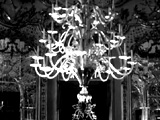


The Opulent But Empty European Hotel/Chateau in Marienbad
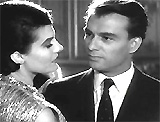
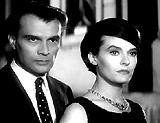
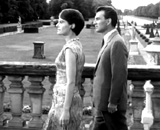
X/Stranger (Giorgio Albertazzi) With A/Woman-Lover
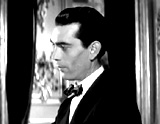
M
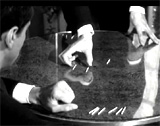
The Mathematical Games
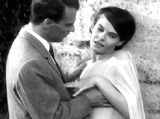
X Touching A's Breast in the Garden
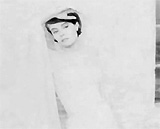
Over-Exposed and Washed-Out Tracking Shot
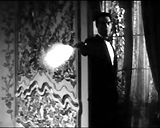
M Firing Silencer-Gun at A

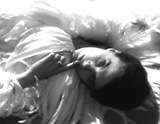
A's "Murder" by M
|














